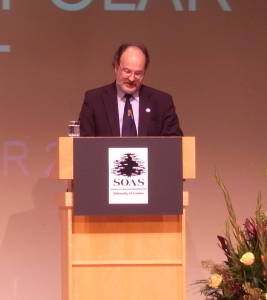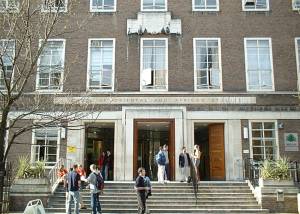While University of London students voted overwhelmingly to boycott Israel in a biased referendum, Jewish students felt afraid and unwelcome on campus.
Students and staff at the School of Oriental and African Studies (SOAS) University of London voted overwhelmingly to sever all ties with Israel at a referendum that the Student Union openly admitted was “biased.” Although the vote is not actually able to change university policy, if adopted, it would mean the end of a study abroad program at the Hebrew University of Jerusalem.
Out of some 2,000 participants, including students, academics, and university staff, 75 percent voted yes. The vote was held during so-called “Israel Apartheid Week,” during which there was extensive campaigning by both the Student Union and the school’s BDS organization in support of the boycott.
Student Union executive members Georgie Robertson, Kabir Joshi and David Suber openly confessed to anti-Israel bias in a statement which read, “We have received some constructive criticism from members of the SOAS community who have rightly believed that the union has a bias when it comes to the referendum. This is correct.” They added that any suggestion that they are neutral would be “dishonest and false.”
Despite this bias, in a statement following the vote, the Student Union claimed it “was conducted in an open, fair and transparent environment” and that “both the ‘yes’ and ‘no’ campaigners were given equal platforms to hold panel discussions and debates.” Pro-Israel students report a hostile atmosphere on campus, where they can be outcast and even threatened for expressing positive views of Israel.
“We are too scared to go anywhere so we walk in a group to the station. People come up to me and say, I heard you hate Palestinians,” said SOAS Jewish Society president Moselle Paz Solis of Guatemala. An older student from Israel, 63-year-old Richard Galber, even reported being thrown out of the Israel Society for objecting to sanctions on Israel. “It seemed to be an anti-Israel society. They asked me to leave. I have never felt so un-belonging as at that meeting. It was a very unpleasant sensation. I assumed an Israel Society would be welcoming to Israelis.”


Paul Webley, director and principal of the School of Oriental and African Studies, University of London.
Following the referendum, Solis said, “We will be taking our concerns to Paul Webley, the director of SOAS, because he has a duty of care to foster good relations between different religious and ethnic groups – this referendum does the opposite. It is divisive and we believe will lead to a deterioration between Israeli and Jewish students and other groups at SOAS.”
According to the Jerusalem Post, an unnamed SOAS administration official emphasized that the school itself was not involved in the vote and is not obligated to act in response to it. He also noted that fewer than 30% of those eligible to participate had done so. “As highlighted in the Students’ Union’s own correspondence, the school has no legal obligation to act on the result of this vote,” he stated.
Last month, the UK Parliament issued a report on anti-Semitism in the country, noting that the Israeli-Palestinian conflict often served as an excuse for anti-Semitic rhetoric and violence. The number of anti-Semitic incidents reported in the UK doubled in 2014, primarily in the context of the summer war between Israel and Hamas.

